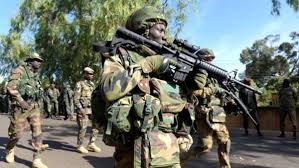Maureen Okpe
With few days to the 2023 polls, the Civil Society Legislative Advocacy Centre, (CISLAC) has called for the repositioning of the Nigerian military
stating they must not be politicized and used for targeted and selfish goals.
The demand was contained in an opening address by the Executive Director, CISLAC, Auwal Ibrahim Rafsanjani, at a One-Day CSOs and Media dialogue in Abuja.
Rafsanjani urged for a new agenda to be set in place for incoming political holders to ensure the defence sector be seen as objective in carrying out it’s mandate.
He said, “as we prepare to go to the polls again, we must be mindful of the fact that corruption cannot thrive in the defence and security sector only if we get it right in our choice of a democratic leadership.
“This is because it takes political will to entrench effective civilian oversight of the sector as over the years, election exercises have been characterized with militarization, because politicians, as usual, would want to insist on enforcing themselves on the people.
“Nigeria’s defence and security sector must always be seen as carrying out its mandate in an objective manner and must not be politicized and used for targeted, biased, and selfish goals.
“This is the right time to demand commitments, objective and unbiased representation both from the defence and security sector and from politicians seeking various political offices.
“No defence or security personnel should be compromised or seen exhibiting unprofessionalism during the elections just because of what they feel they stand to gain after these politicians assume office. If they are caught, they must be seen to be punished commensurately. Democracy is centred around the people, anything short of this is a no,” he stressed.
A lecturer from the University of Nigeria, Nsukka, (UNN), Prof. Freeman Onuoha in his presentation on the ‘case study of past, current defence and security corruption in connection with politics -the gap and effect on human society, expressed concern over the continuous links between defence sector corruption and failure in security provisioning which are increasingly gaining attention.
Prof. Onuoha stated that Nigeria has witnessed an unprecedented level of insecurity, resulting in increased budgetary allocations to the defence and security sector as a total of N11.18 trillion was budgeted for security from 2015 to 2022.
According to him,”there is growing concern, if not consensus, that defence corruption inhibits the ability of Nigerian armed forces to effectively tackle the multidimensional security threats confronting the country.
“In a Government Defence Integrity (GDI) index, Nigeria is listed among two-thirds of all the countries facing very high to critical corruption risks in their defence and security sectors.
“The defence sector will always be vulnerable to corruption, due to the risks from high levels of secrecy, complex technical procurements and exploitation of the sector by corrupt politicians within the defence sector, corruption often lead to great waste of resources and sub-optimal performance of defence forces.
“Defeating defence corruption is a notoriously difficult endeavor, but it is a precondition for regaining societal confidence in the defence sector,” he said.
Also, resource person from the Nigerian Defence Academy, Sunday Adejoh, reiterated that, despite extant laws that requires sharing of public information such as the Freedom of Information Act, 2011, the security sector in Nigeria remains one of the most opaque and secretive sectors in the country.
Adejoh noted that, the official Secret Act, LFN 2004 is at variance with the FOIA while the Act appears to be a tool for unveiling the secrecy and has the potential of promoting transparency and accountability if properly utilised, the experience is that the secrecy culture is still pervasive, as most government agencies do not respond to FOI requests.
He said, “they take advantage of exemptions in the law. For instance, section 11 (1) of the FOIA provides that a public institution may deny an application for any information the disclosure of which may be injurious to the conduct of international affairs and the defence of the Federal Republic of Nigeria. Civil Society Organisations who have tried to get information from the Office of the National Security Adviser have been met with this response.
While proffering solutions Adejoh said, ” there should be increased capacity building for security sector oversight bodies such as the National Assembly, with the office and mandate of the national security Adviser should be clearly spelt out in the constitution.
“The government should initiate reforms in order to deal with the issue of secrecy in the security sector as a challenge to oversight, as well as a need to continue to promote civil-military relations and best democratic practice.”


[…] Read Also: CISLAC calls for repositioning of Nigerian Defence sector […]